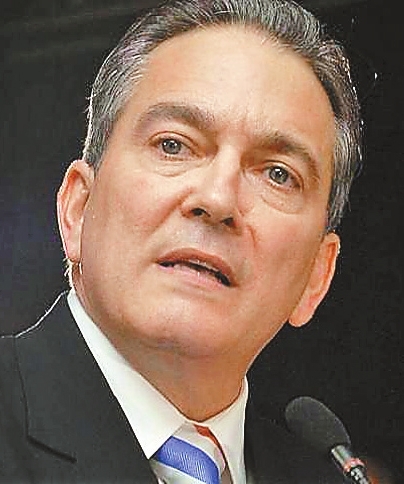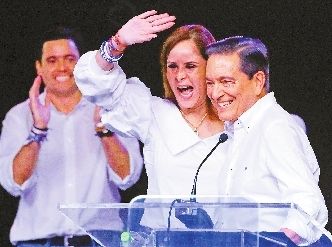

LAURENTINO CORTIZO, who has won the presidential election in Panama with a two-point lead over his nearest rival, is a veteran politician and former agriculture minister of the small Central American country. The 66-year-old businessman and cattle rancher, popularly known as “Nito,” will serve a single five-year term as head of state of a nation famed for its canal but also known for its financial sector which is accused of providing a haven for international tax evasion. The terse and stern-looking Cortizo, who campaigned on an anti-corruption ticket, has said he wants to “rescue and transform Panama” and leave a legacy untainted by graft. In his victory speech Monday, Cortizo called for national unity, after winning 33.2 percent of the vote with the country divided about its choice in the one-round election. “Panama won today, and today more than ever, Panama needs to join forces,” Cortizo told cheering supporters in the midnight speech at his campaign hotel. During the election campaign, Cortizo vowed to clean up politics after the nation’s image was tarnished by a corruption scandal involving Brazilian engineering firm Odebrecht, and the Panama Papers leak of millions of documents detailing tax evasion by the rich and powerful. “Panamanians don’t want, or merit, and won’t put up with more of the same,” Cortizo added. “The chaos is over. Public funds belong to the public, and they are sacred.” He briefly served as agriculture minister in the government of former President Martin Torrijos (2004-2009). Corizo resigned after just 15 months in the government because he opposed concessions to relax health standards during negotiations for the U.S.-Panama free trade agreement, which was signed in 2007. Passionate about improving cattle breeds, he is known for his hands-on approach, helping with milking, vaccinating and tending to his herd. Cortizo, who focused his campaign on the fight against inequality, is praised by supporters for his humility and social sensitivity. Opponents however accuse him of being surrounded by lawmakers embroiled in corruption scandals. To them, Cortizo insists that no one will be “untouchable” during his term in office. “Listen to me ... we will [govern] without stealing,” he said during the two-month campaign. Born on Jan. 30, 1963, Cortizo is the son of a haulier of Spanish origin, Laurentino Cortizo, and a construction business owner and teacher of Greek origin, Esther Cohen. He has a masters in business administration and studied international trade deals at the University of Texas in Austin in the United States. He returned from the United States to Panama to take charge of his family’s construction company and began his political activism with the Democratic Revolutionary Party (PRD) in the 1990s. In 1994, Cortizo won his first term as MP for the Caribbean coastal province of Colon and did not hesitate to travel by horseback or in a dugout canoe to meet voters. He later became president of the National Assembly in 2000 and 2001. “Nito” maneuvered skillfully to convincingly win the primaries of his Democratic Revolutionary Party, observers say. “Cortizo, without being a member of the PRD leadership, has confronted the structure [of the party] and, without dividing it, has managed to become the presidential candidate” of the PRD, said James Aparicio, editor of the Metro Libre daily. The party was founded by his mentor Torrijos, to whom he bears a striking resemblance. Cortizo has promised to improve the education system, reform the state to make institutions more transparent, and develop the economy. He also pledged to create ministries of culture and women, to make agriculture an affair of state, and to punish companies guilty of corruption. “I want to leave a legacy” in the history of Panama, said Cortizo, who managed to return the PRD to power after 10 years in the political wilderness. Corruption scandals played a significant role in election campaigning in a country struggling to shed its image as a money-laundering paradise following the Panama Papers scandal three years ago. Equally damaging was the admission by Brazilian construction giant Odebrecht that it had paid US$59 million in bribes in Panama between 2010 and 2014 to secure major public works contracts. Panama is home to the strategic canal that links the Atlantic and Pacific oceans, making it a key conduit in the global maritime trading system. Cortizo, a U.S.-educated college football fan, has stressed the importance of improving relations with the United States. “The United States is our strategic partner, our main strategic partner,” Cortizo said Monday. “This relationship has to improve.” Outgoing President Juan Carlos Varela’s decision to establish formal ties with China and sign infrastructure projects with it caused concern in the United States, which has strong historical links to the Central American country. The United States oversaw construction of the Panama Canal in the early 20th century and it did not formally cede control of the waterway until the end of 1999. Cortizo has close ties to the United States, and his children hold U.S. passports. After studying in Texas, he worked for the Organization of American States (OAS) in Washington. There he met his future wife, Yazmin Colon, a native of Puerto Rico who was studying literature. The couple have two children, two grandchildren and two dogs. But the passionate fan of American football who travels north to watch the University of Texas Longhorns said the United States needed to be more careful in Central America. It was in Washington’s own interest, said Cortizo, to help boost trade and investment in the region. Despite his close ties to the United States, Cortizo has had his differences with it in the past. In 2006, he resigned as agriculture minister during the government of President Torrijos, arguing that a U.S. free trade deal would force Panama to ignore its own food health standards. “When he decided to leave the government, it was difficult to understand,” said Samuel Lewis, a former vice president and friend of Cortizo. “But it was a well-informed decision, and that is respectable.” Politicians, colleagues, friends and family all say that Cortizo, who served two terms in Congress from 1994 to 2004 and was president of the legislature from 2000 to 2001, has the skill to assemble teams that work effectively. “Cortizo is a conciliator, and this will be important in the moment in which he has to unite Panamanians to solve the problems we face,” said Juan Carlos Navarro, an erstwhile rival within the PRD and a former mayor of Panama City. Still, political adversaries worry Cortizo may seek to concentrate too much power. Businessman Mario Martinelli, the brother of former President Ricardo Martinelli and a supporter of Cortizo’s main rival, called the leader a friend, but said that Panama did not want a system where the president was too dominant. Cortizo, he said, tended to be “overbearing.” The new president will have to contend with the economic and political crisis in Venezuela, which prompted tens of thousands of Venezuelans to seek work in Panama’s dollarized economy, creating discontent among Panamanians who fear for their jobs. Cortizo has urged a negotiated resolution to the crisis. Poverty was a dominant issue of the election campaign, and Cortizo said he will improve water supply and health care in Central America’s fastest-growing economy. The next president is due to take office July 1.(SD-Agencies) | 
